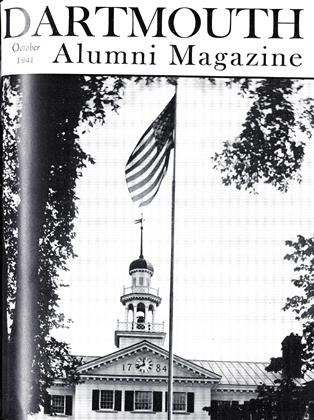PROCEEDINGS OF THE SECOND N. H. BANK MANAGEMENT CONFERENCE
October 1941 William A. Carter '20.By G. W. Woodworth and A. W. Frey '20,Editors, Edwards Bros., 1941, p. 97, $1.00.
IN THE Proceedings of the Second New Hampshire Bank Management Conference, most of the papers and discussions deal with bank credit analysis; bank investments; banks and the defense program; and the United States and the defense program. There are, however, miscellaneous papers dealing with savings bank membership in the Federal Home Loan Bank system and bank cost analysis in relation to service charges.
For alumni especially interested in bank management problems, the reviewer recommends as outstanding among the many good papers: Roy A. Foulke's Bank Credit Analysis, Philip E. Bennett's Real Estate Appraisal fromthe Banker's Standpoint; Lynn E. Bollinger's Financing National Defense Contracts; and L. S. Pruyne's The Investment Portfolio.
Alumni in general will find interesting that portion of the proceedings devoted to the economics and psychology of national defense. Professor H. Barton Leach of the Harvard Law faculty presents an excellent paper entitled Sabotage in the United States. He briefly reviews sabotage experience in the United States during the first World War. He then cogently pleads for immediate action to prevent the occurrence of similiar experiences here as the United States becomes a well- stocked arsenal for the opposition to Hitlerism. President E. M. Hopkins' banquet address feelingly presents the thesis that we must establish a defense against our complacent selves and awake to the dangers in the making which are products of reality and not hysteria. The Conference panel discussion— heretofore not recorded in the Proceedings—. is included in this volume. A panel composed of members of the Dartmouth faculty discuss broadly Democracy and the National DefenseProgram.
From the Oxford University Press comes a finely printed volume of 425 pages—VingtContes Favoris, chosen and edited by Profes- sor Foster E. Guyer '06 and Professor Arthur G. Bovee.
This textbook has been prepared for students in their second year of college and in their third year of high school French. The authors state that "This collection offers American students twenty of the most interesting short stories available in French. The editors have kept before them a two-fold purpose in making their selection: (1) to acquaint students with some of the greatest of modern French short story writers; (2) to present the most delightful of their stories, especially those that long experience has shown appeal most strongly to Americans." The authors represented are Guy de Maupassant, Alphonse Daudet, Prosper Merimee, Emile Zola, Victorien Sardou, Francois Coppee, and Honors de Balzac.
 View Full Issue
View Full Issue
More From This Issue
-
 Article
ArticleDartmouth Again Faces A World Crisis
October 1941 By WM. STUART MESSER -
 Article
ArticleFavorable Financial Year
October 1941 By Alumni Fund and Over Two Millions Added to Assets -
 Article
ArticleCollege Opens With Convocation Address
October 1941 -
 Class Notes
Class Notes1917*
October 1941 By EUGENE D. TOWLER, DONALD BROOKS -
 Class Notes
Class Notes1912*
October 1941 By CONRAD E. SNOW, RICHARD C. PLUMER -
 Article
ArticleOut-Of-Doors Disciple
October 1941 By ROSS McKENNEY
Books
-
 Books
BooksBriefly Noted
NOVEMBER 1967 -
 Books
BooksHORTON HATCHES THE EGG
December 1940 By Alexander Laing '25 -
 Books
BooksTHE CROSS-COUNTRY SKI BOOK.
FEBRUARY 1965 By CHARLES E. BREED '51 -
 Books
BooksDOWN THE DORDOGNE
June 1933 By D. E. Cobleigh -
 Books
BooksBYSTANDER
MAY 1930 By E. P. K. -
 Books
BooksThe Start of It All
September 1975 By J.H.

